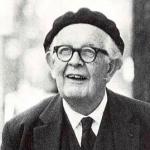First of all, we’re in a series on the works of C.S. Lewis. So catch up![1] Secondly, in this portion of the series, Vernell Ingle explores postmodernism as forecasted by C.S. Lewis.
Actually, postmodernism grew out of French Philosophy in the late 1800’s, however it seems like Lewis captures and predicts its early effects on society.
Natural versus Supernatural (continued)
One point that Lewis made about miracles was that the miracles recorded in Scripture, and miracles that take place today, are not happenstance.
Miracles have a purpose. They are a part of God’s grand scheme.
At the end of his book Miracles, Lewis discussed the primary Christian miracles. The incarnation, he asserted, is the central or grand miracle. Consequently, every other miracle recorded either prepared for this or resulted from it.[2]
One of the most powerful passages in this work was his discussion of man’s difficulty to move from the notion of an abstract and negative deity to the living God. He contrasted the pantheist’s god with the Christian God. The true God is not hated because He was pictured as a man, but because He is pictured as a King, or even a Warrior.
“The Pantheist’s God does nothing, demands nothing. He is there if you wish for Him, like a book on a shelf. He will not pursue you.”[3]
An “impersonal God” – well and good. A subjective God of beauty, truth and goodness, inside our own heads – better still. A formless life-force surging through us, a vast power which we can tap – best of all. But God Himself, alive, pulling at the other end of the cord, perhaps approaching at an infinite speed, the hunter, king, husband – that is quite another matter . . . There comes a moment when people who have been dabbling in religion (“Man’s search for God!”) suddenly draw back. Supposing we really found him? We never meant it to come to that! Worse still, supposing He had found us? So it is sort of a Rubicon. One goes across; or not. But if one does, there is no manner of security against miracles. One may be in for anything.[4]
Men Without Chests
Miracles was difficult reading at times, but The Abolition of Man, in some places, was even more difficult. Yet the gist of the message was clear.
Lewis began his argument by using an example of an elementary book in English. The two writers of this English text use an illustration about one’s feelings in regards to a waterfall. In essence they explain away one’s comments about the waterfall as not being about the waterfall itself, but more accurately about one’s own feelings about that waterfall.
Lewis went on to point out that one who buys into this line of reasoning will believe two propositions, “firstly, that all sentences containing a predicate of value are statements about the emotional state of the speaker, and, secondly, that all such statements are unimportant.”[5]
Lewis talked about what he called the Tao.
The Tao is the timeless and universal belief, that certain attitudes are really true and others are truly false. Furthermore, this conception is found all religions and philosophies: Platonic, Aristotelian, Stoicism, Christian, and Oriental. He called it the doctrine of objective value.
The philosophy behind this elementary book in English is what Lewis attacked. Basically there are no absolute standards or values outside of one’s own personal value system.
C.S. Lewis, November 1950 | John Chillingworth | gettyimages
It seems like Lewis was prophetic in his attack, because today we are witnessing that very effect in postmodernism.
Postmodernism has been called the death of truth.
This is mainly carried along in the politically correct movement. Postmoderns believe that reason, rationality, and confidence in science are all cultural biases. Furthermore, those with these biases, like those in science, Western education, and even governmental structures, are really acting out of their European cultural conditioning. Postmoderns believe this is for the purpose of retaining power in the hands of the social elite.[6]
Interestingly, it seems like Lewis is addressing this issue some fifty years ago when it first began to raise its ugly head. So that is the premise of his book. One ideal of postmodernism is that no one system is wrong, therefore there should be no judgment of anyone’s system. As a result, the only evil is when someone judges another as being wrong. The question is, what then is right?
Lewis indicted the operation of this particular English ideal, and consequently postmodernism, as producing men without chests. The paradox of this system is cunningly pictured by Lewis.
“We make men without chests and expect of them virtue and enterprise. We laugh at honour and are shocked to find traitors in our midst. We castrate and bid the geldings to be fruitful.”[7]
Lewis likened the rebellion against the Tao to branches rebelling against the tree. So that is the futility of postmodern man rebelling against what he knows in his heart to be absolute truth. If such rebellion could succeed they would only find that they have destroyed themselves, claimed Lewis.
“The human mind has no more power of inventing a new value than of imagining a new primary color, or, indeed, of creating a new sun and a new sky for it to move in.”[8]
Lewis argued that we must accept the ultimate platitudes of Practical Reason as having absolute validity.[9] Therefore, the ultimate argument is that there are absolutes, no matter how much postmodern man may struggle against these absolutes. C.S. Lewis began arguing against postmodernism, long before it really began to surface, in The Abolition of Man.
Basic Questions:
1) First of all, is it fair for C.S. Lewis to state that we can’t find God because we’re searching for a false ideal of Him? So if our view of God is corrected, are Lewis’ questions justified? “Supposing we really found him? . . . Worse still, supposing He had found us?”
2) Because postmodernism is often set against absolutes, then what effects do we see in society as a result? Similarly, can we as Christians argue against absolutes while still maintaining our high view of Scripture?
3) Above all, what’s your reaction to Lewis’ (seemingly prophetic) declaration that society is now manufacturing men without chests?
[1] This post is part of a series about C.S. Lewis.
Aslan Acrostic: Dr. Thomas Woodward shares the story of C.S. Lewis
Vernell Ingle reflects on the works of C.S. Lewis
Vernell Ingle reflects on the works of C.S. Lewis, pt. 2
A Distinction in Ancient Literature (a/v)
Vernell Ingle reflects on the works of C.S. Lewis, pt. 3
On the Supernatural as the Natural Life (a/v)
[2] C.S. Lewis, Miracles: A Preliminary Study (New York: MacMillan Company, 1946), 306.Amazon: Miracles
Amazon: The Abolition of Man
Amazon: The Death of Truth













